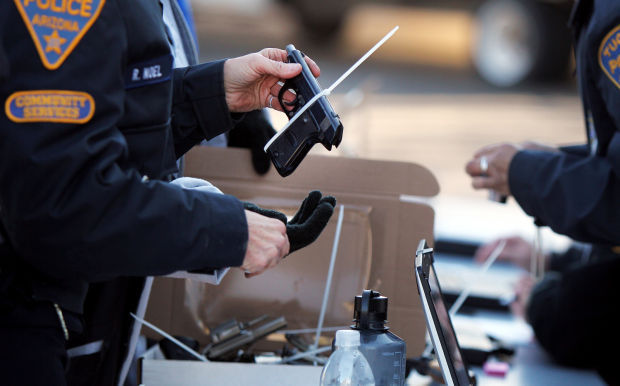You’ve noticed the shortage of guns in Tucson since 2005, haven’t you?
You know, nobody can buy a shotgun or a rifle or a pistol around here. Nobody.
Right?
Of course not.
It has not been any harder to buy a gun in Tucson since the City Council passed the ordinance requiring that firearms seized by police be destroyed in most cases. That’s why the ordinance is absurd. Destroying 4,820 seized or forfeited firearms since January 2013 has done nothing to curb access to firearms or to stem gun violence.
So it’s no wonder that someone got upset that we were essentially throwing away money by destroying the usable guns rather than selling them to a licensed dealer and getting some money out of them.
It’s just too bad that somebody was a state legislator from Oro Valley making the complaint to the attorney general instead of a Tucson resident making the case to the City Council.
The ordinance is pointless and seems to directly contradict a 2013 state law, aimed at Tucson, which prohibits cities from destroying seized guns. But it is our right to have pointless ordinances and hash out the arguments ourselves, without putting $115 million per year in jeopardy.
That’s why it’s a good thing the City Council voted unanimously Tuesday to fight a state law that threatens the city’s financial viability if a single legislator thinks it may be violating state law. The council’s underlying ordinance is wrong, but the state law is even wronger.
You may remember when the Legislature passed SB 1487 this year — it was one of 14 so-called “pre-emption” bills introduced last session that attempted to undermine local control. Messing with cities had been a hobby for the Legislature in the past but became an animating force among Republicans last session.
SB 1487 was the climax of the effort. It allows any individual legislator to report to the attorney general any city action that seems to violate state law or the Constitution.
This is one of the absurdities of the law: Here we have Rep. Mark Finchem, who believes Hezbollah has camps in northern Mexico and is allying with drug cartels to attack the United States, singlehandedly commanding that Tucson spend money to defend itself. That’s more power than one hostile legislator ought to have.
Under the new law, the attorney general must investigate the apparent violation within 30 days and tell the city whether he believes it is violating, may be violating or is not violating state law or the Constitution. If he finds the city is violating state law, the city must change within 30 days or have its state-shared revenue withheld — $115 million per year in Tucson’s case.
This is another problem with the law. It makes the state attorney general judge and jury over what constitutes a violation of state law.
Even if the attorney general finds that the city might be violating state law, the city must post a bond equal to six months worth of state-shared revenue — in Tucson’s case, about $57 million — while the state Supreme Court decides who’s right.
“The state can pre-empt us on matters that are truly of a statewide concern. The state can’t pre-empt us on matters of local concern,” city attorney Mike Rankin told me before Tuesday’s council vote.
That’s especially true of charter cities like Tucson, Rankin said.
“The Arizona constitutional framers specifically decided they did not want charter cities to be subordinate to the state,” he noted. “They were giving us true home-rule powers. They embedded that in the Constitution.”
Now, of course the Attorney General’s Office is aware that Tucson is a charter city. But in its filings the office argues the city does not have the right to supersede state laws related to firearms, over which the Legislature has asserted authority. And Attorney General Mark Brnovich calls it a Second Amendment issue. It is not.
The arguments actually veer into the realm of the absurd. One point: The city interferes with the right to keep and bear arms by destroying seized guns. Another point: “The State believes that increasing the supply of firearms is in the interest of public safety.”
Both of these arguments rest on the same fallacy that the city’s gun-destruction ordinance does: That Tucson’s ordinance makes a whit of difference when it comes to the supply of guns.
Here’s a quick data point: Last month the FBI conducted 39,722 background checks for gun purchases in Arizona. That’s nearly 40,000 possible purchases statewide in one month. In the real-world context, Tucson’s 105-or-so destroyed guns per month make no significant difference in the right to bear arms or the supply of guns.
It’s still a dumb ordinance. Better to make some money off those guns than to destroy the ones that have value.
But it’s our dumb ordinance to fight over and none of the state’s business.







